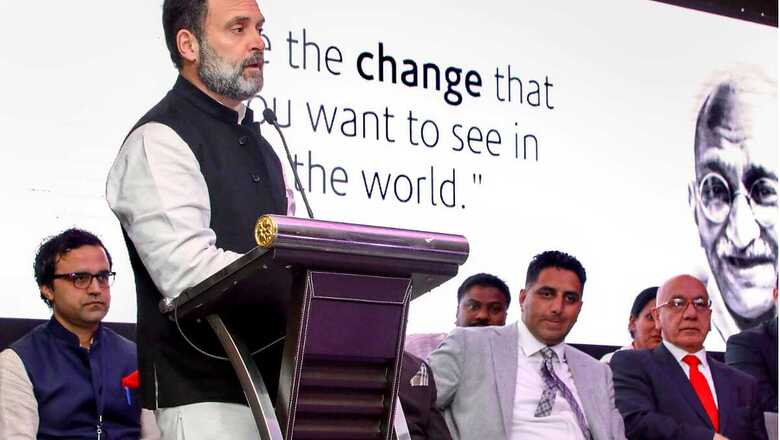
views
The recent speeches of Rahul Gandhi abroad, at Cambridge University, and within the precincts of the British Parliament, have, predictably, caused considerable controversy. His speeches need to be analysed critically, rather than oscillating between black-and-white polarities.
One thing is clear: washing a country’s internal laundry for a foreign audience is a project that needs great nuance and sophistication. There can be open criticism and condemnation between political parties within the country, and we see a great deal of it in our increasingly debased political discourse. Our politics has become so polarised that some of it is bound to spill over in speeches abroad. But even so, when abroad, the same points have to be made keeping in mind that even if one is in the Opposition, ultimately the reputation and public image of the nation are at stake. This does not mean asphyxiating the strongly different narratives about what India should be, but to say that in a way where it does not appear to be an unalloyed trashing of the country’s government as a whole. The same critique can be presented by outlining what your ‘idea’ of India is, and adding that this ‘idea’ needs to be protected from any threat.
Such an approach needs to be prefaced by saying that India, like any democracy, is not perfect, and that much needs to be challenged and rectified, but that India itself has more than once demonstrated that it is capable of solving its internal problems. In other words, what needs to be stressed is that we shall democratically resolve our internal differences, even if we don’t entirely gloss over what the obstacles are.
The reasons for this are both pragmatic and ideological. Pragmatic because this kind of vitriolic condemnation does not go down well with ordinary Indians — in India and abroad — who, even if unhappy with many issues in the country, don’t want to have the country’s image sullied abroad. Ideological, because nothing is entirely bad or completely good. Criticism of what is happening in the country should be leavened by the expression of optimism and faith in the country’s resilience and future, and the recognition also of its strengths, because that sounds more credible, mature and objective.
Therefore, when Rahul Gandhi says to a foreign audience that Narendra Modi is ‘destroying the architecture of India’, and ‘blowing the country to smithereens’, he is bidding goodbye to all nuance. A much better way would be to recall the ideals that inspired the Congress party, the vision that animated the freedom movement, and the principles that are enshrined in the Constitution. In this context, he could have said that if there is ever a threat to the Constitution, or the freedom and liberty of individual citizens — that are the bedrock of our democratic system — the Congress party will fight this threat within the parameters of the country’s democratic framework. In this context, he could add, to give even more credibility to his own statement, that when the Emergency was imposed, it was the people of India who fought against it, and defeated it.
Similarly, it is one thing to say that he and the Congress party will fight — as the Bharat Jodo Yatra just showed they can — the erosion of institutions like the judiciary and media freedom, and quite another to almost allege that they have ceased to exist, thereby painting India as a banana Republic. I have been a diplomat, and it was then my professional duty to defend my country’s image. When I transitioned into politics, there were still foreign audiences that I addressed, where I was less reticent about issues that caused me concern in the country, but I never trashed the government completely, and always began by saying that Indians can solve their own differences, while simultaneously reiterating that I have full hope and confidence in the country’s future.
On other issues, Rahul came across as a deliberative political leader, although I did find his analysis of China as representing ‘harmony’ and America as representing ‘openness and individual liberty’, without any reference to the absence of democracy in China, and the continued discrimination within America against the coloured, a bit simplistic.
Finally, Rahul’s repeated use of the phrase ‘conversation’, ‘negotiation’ and the importance of democracy, may ring a little hollow in a party, where without holding any democratically elected post, he is the de facto supremo, who appears to be hostile to any dissent or criticism. The attack on the so-called G-23 in the Congress by Rahul Gandhi at the Congress Working Committee meeting was certainly not the best example of ‘conversation’ or ‘negotiation’ or inner-party democracy.
The BJP’s reaction to Rahul was equally predictable, invoking patriotism and nationalism to insulate itself from criticism. But the ruling party should also understand that irrespective of what Rahul said, what is happening in the country cannot be hidden or glossed over. As I said in my last column, India, in today’s world of media and electronic intrusiveness, is like a fish in a glass bowl. What happens here, given the sheer importance of the role our country will play in the future, is there for everybody to see abroad as well. The BJP should keep this in mind.
The author is a former diplomat, an author and a politician. The views expressed in this article are those of the author and do not represent the stand of this publication.
Read all the Latest Opinions here




















Comments
0 comment